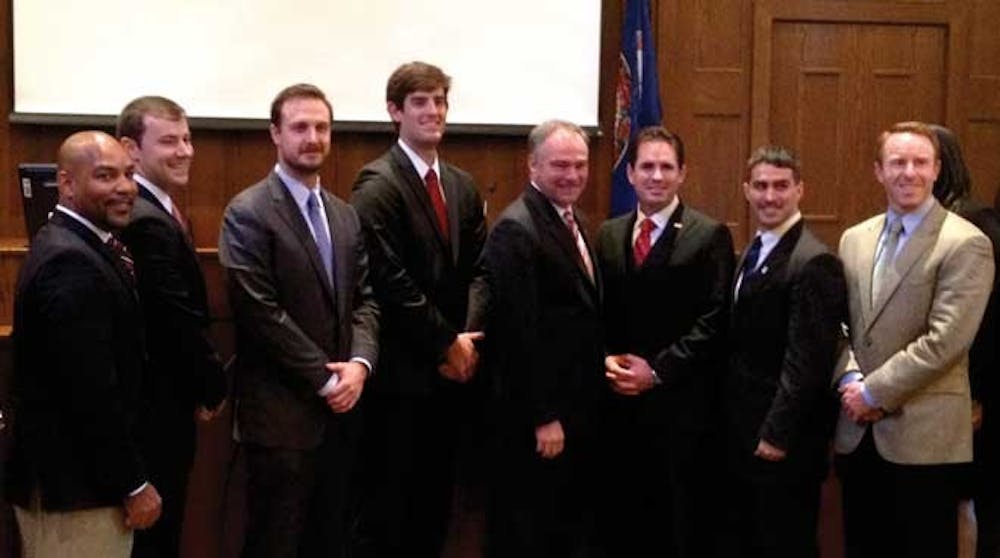Veterans from each age of our nation's history have faced challenges upon returning home, but the men and women who have served in Afghanistan and Iraq are dealing with a new series of legal and emotional issues when they return.
As the keynote speaker at the Veterans Law Symposium held in the University of Richmond School of Law's Moot Courtroom last Friday, Sen. Tim Kaine identified these current issues, and called on roughly 75 audience members to consider veterans' place in the changing landscape of our society.
"We don't have the experience base to look at these new problems with," Kaine said. "With advancements in technology we are faced with fundamental questions about warfare, such as when and how this current war will end."
He described that the length of our conflict in Iraq and Afghanistan has led to multiple deployments for many service members, and the effects of repeated deployments hasn't been measured before. This new dilemma, compounded with Congress' seemingly open-ended declaration of war after Sept. 11, could lead to even more deployments and hardships for our veterans, Kaine said.
"Congress declared war upon those responsible for 9/11 and their affiliates," Kaine said. "The lack of a timetable or geographic scope makes it a completely open-ended declaration of war."
Kaine also discussed backlogs for veterans seeking disability claims and the increase in reported cases of sexual misconduct within the military.
He described how the lengthy battle veterans face to receive disability compensation is due in large part to the U.S. Department of Veterans Affairs' (VA) paper record system.
"The VA was a paper record system until 2008, when they decided to go to an electronic system to deal with disability claims on backlog," Kaine said. "Educational benefits have also become a problem for veterans since the paper to electronic shift."
Kaine cited a student he knew who was trying to receive an educational benefit for second-semester funding. The student achieved a good GPA during his first semester, but when he called to see when he would receive funding for the second semester, he was told his file was still sitting on a desk and needed to be shipped elsewhere for evaluation.
More women entering the military and the elimination of gender prohibition has led to a growing issue of sexual misconduct, Kaine said. He noted that this doesn't necessarily mean that sexual misconduct has increased in the military, but that only the number of reported cases is rising.
"There is a bill on the Senate floor proposing two dozen changes to all components of this issue," Kaine said. "Components like the investigation process and protecting victims, witnesses and whistleblowers will all be debated over in the next few weeks."
He closed the lecture by receiving questions from the audience, one of which inquired as to how the Department of Defense (DOD) would deal with the influx of returning service members as the drawback from the Middle East continues. The DOD needs to help active-duty service members earn civilian credentials for the skills they acquired in the military, Kaine said.
Enjoy what you're reading?
Signup for our newsletter
"Current veterans re-enter the job market and hiring officers don't understand what they did for the military," Kaine said. "It goes back to former drafts, where a higher number of service members meant a potential employer would understand a veteran's technical skills. Now that less that 1 percent of the population is in service, those service members don't earn credit for real-world experience."
After Kaine's speech, a panel of members from the Veterans Issues Task Force, along with a lawyer and a veteran, discussed the disability claims issue in great detail.
Michael Higgins, of the American Legion Post 368, said that on average it takes 300-800 days for standard disability claims filed by veterans to go through the review process.
John Paul Cimino, director of Helping Military Veterans through Higher Education (HMVHE) at William & Mary Law School discussed how different kinds of claims have made it difficult for veterans to receive disability compensation.
"It's clear that a guy missing their leg from the knee down was disabled during service and deserves compensation," Cimino said. "The harder cases are from those who suck up an injury during their service and following career and don't file a claim until they need a knee replacement to keep working, or decide to file a claim for Post Traumatic Stress Disorder."
Ed Simpson and Greg Collins, the president and vice president of the Veterans and Military Law Association, respectively, organized the event and contacted the various panel members.
Simpson is also the symposium editor for the Richmond Journal of Law and the Public Interest, and Collins is the recipient of the prestigious Tillman Military Scholarship.
Contact reporter Clay Helms at clay.helms@richmond.edu
Support independent student media
You can make a tax-deductible donation by clicking the button below, which takes you to our secure PayPal account. The page is set up to receive contributions in whatever amount you designate. We look forward to using the money we raise to further our mission of providing honest and accurate information to students, faculty, staff, alumni and others in the general public.
Donate Now



